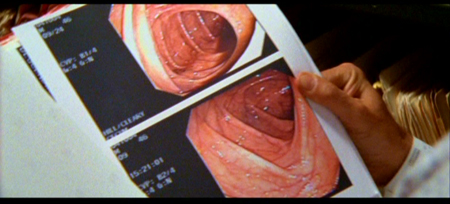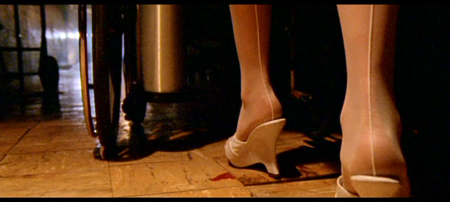
BUY IT AT AMAZON: CLICK HERE!
STUDIO: Warner Bros.
MSRP: $24.98
RATED: NR
RUNNING TIME: 113 minutes
SPECIAL FEATURES:
• Commentary and interviews w/ writer and director
• Additional footage from the "Surgical Exorcism"
• Theatrical trailer
The Pitch
"It’s
faux-Freudian dream interpretation!"
The Humans
Tom
Cavanagh, Katherine Cunningham-Eves, Kathleen York.
The Nutshell
Poor
George Grieves (Cavanagh). He’s turning forty and he needs a colonoscopy. It’s
from these things that the stuff of nightmares is made. It was supposed to be a
simple procedure, just a quick camera up the butt; but when George wakes up
from his anesthesia, he finds himself in a strange hospital room, with a scar
he shouldn’t have, and no one willing to give him answers. Armed with only the
fragments of his own memories and the haze of recurring dreams, George starts
to piece together the events and forces that brought him to this place.
Will
George be able to discern between medical malpractice and Satan? Can any of us?
The Lowdown
I love a
good sense of cognitive dissonance, whether it’s a picture of Devin kissing a
puppy or the myriad arguments in favor of intelligent design. The implied irony
goes a long way toward providing various motivations for me as an individual,
and also for characters in fiction. When you’re assaulted by such dissonance,
there’s not much you can do to save your sanity except find that one resolving
tone.
You might
want to be prepared for a little of that when you first pop this disc into your
player. You have been confronted with the cover art, with its suggestion of
sex, violence, and tattoo parlors, but at the movie’s opening you’re confronted
with this landscape, set to a meditative melody:

People who dream in color are vain fuckers.
I mention
this because I think it was a smart move by the marketing department at Warner
Bros. Messing with audience expectations is a minor but longstanding tradition in
horror/thriller, but by setting it up so that viewers of Sublime hold their first
experience of the film in direct tension with the impression they had (likely)
formed about what it would be, the film’s theme gets an early introduction.
Though
the viewer’s confusion is resolved quickly, George Grieves is not so lucky. His
lengthy stay in the hospital is a direct result of his inability to locate the
pitch which would bring the dissonance in his own brain back to the tonic. His
case is not so unusual, in the generalities, and he fills the role of everyman.
Comparisons can be drawn all over the place between Sublime and Jacob’s
Ladder, but Grieves possesses none of the distinctive experiences of
Tim Robbins’ character in that movie. Instead, Grieves stands in as a type of
character seen too infrequently in horror these days: the white, liberal,
middle-class American male.

Don’t bother. Someone’s already squatting.
The
particular dissonance that Grieves suffers through might well enough cause you
to roll your eyes, especially if you don’t particular care about the "woe
is me" declarations of the privileged. Grieves life, prior to his stay in
the hospital, was status quo: two kids,
one decently satisfied wife, and a new house. But where other introspective
horror might hinge on some harrowing experience in the past of its protagonist
— some dramatically worthy of introspection, such as murder or the occult — Sublime
instead centers on Grieves’ weak suspicion that he hasn’t made his family
happy.
Know your
audience, I guess. I haven’t seen very many horror films that exploit the
day-to-day inadequacies of your standard white-collar man, but with the premise
thus accepted, Sublime goes down smoothly. The systematic dismantling of
Grieves’ assumptions about himself and his world are handled subtly, for the
most part, calling to mind the more effective sequences from Session
9. Tenderness and humor surface in the relationships between Grieves
and his family, setting the emotional hook a little stronger for those not
immediately distanced by the prosaic premise.

For the love of Mike, please say something like, "The spice must flow," right about now.
That’s
the root of the problem with Sublime, the cognitive dissonance
that gnaws at the audience and remains unresolved. Though the narrative plays
into the tropes of the horror genre, the story is one of personal tragedy,
unaffected, natural, and dangerously close to dull. It’s worth staying around
for the skill with which the moments of Grieves’ internal resolutions begin to
hum, but the concerted efforts of the deliberate contrasts that fill the plot fail
to resolve to a pleasing chord.
The Package
I can’t
look at the cover art without being reminded of Toni Morrison’s Beloved.
From there, my memory dredges up the bastardized Oprah made-for-TV movie. Oops.
Also, the garden shears remind me that I have to go outside and work on the
lawn. So much for escapism.
As for
the real goods, they are worthy but few. There is a full-length commentary with
writer Erik Jendresen and director Tony Krantz, as well as brief interviews
with each. There is also a bit of
footage extended out from one of Grieves’ flashbacks in the film, in which a
certain anthropologist attends a medical exorcism. It’s Grey’s Anatomy meets The
Exorcist!

I’d just like to go on record as a fan of the backseam.
6.5 out of 10